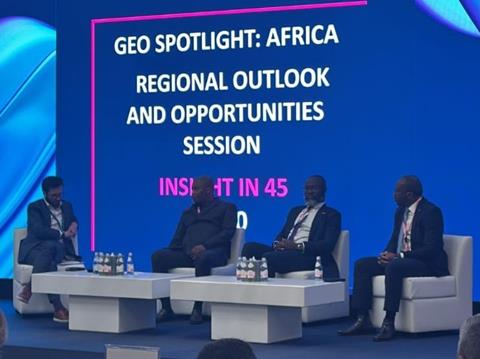Panel discussion in Dubai highlights challenges and opportunities across a diverse continent.
Africa’s insurance and reinsurance sector is navigating a landscape of stark contrasts, with low penetration rates across many markets offset by fast-growing economies, infrastructure development, and increasing digital connectivity.

Speaking during the “Spotlight: Africa” panel (pictured) at this year’s Dubai World Insurance Congress, three African insurance executives emphasised the continent’s long-term potential, but also warned of structural challenges, pricing pressures, and talent shortages.
Webster Twaambo, chief executive of Zambia-based Finsbury Re, said the regional disparity in premium volumes highlights the maturity gap between countries.
“Africa contributes just above 1.5% to the global insurance market, around $90bn, and close to 70% of that is from South Africa alone,” he said.
Yet demographic trends suggest a strong upside. “Africa’s population is expected to double, with the continent recording a 2.5% growth rate, well above the global average. More than 60% of the population is under 25, and mobile usage is at 80%, yet insurance penetration remains below 3%.”
Twaambo argued that this “juxtaposition” between digital access and low penetration creates a clear opportunity to scale inclusive insurance, citing government-backed microinsurance schemes in Zambia as examples.
Clement Owusu, group chief commercial officer of Waica Re, said Nigeria’s Dangote refinery exemplifies the scope of infrastructure-driven opportunity in West Africa.
“With a growing middle class, investment in infrastructure, and financial sector expansion, the region is ripe for insurance growth,” he said.
However, macroeconomic headwinds are squeezing local insurers.
“In Nigeria, we’ve faced major claims in the energy sector over the past two years. Inflation, currency depreciation and debt servicing have forced us to raise deductibles by 20%, reprice retrocession, and exit certain programmes,” Owusu added.
South Africa remains a regional heavyweight but is seeing market softening.
“Catastrophic events like the Durban floods and 2021 riots triggered some price increases, but in 2024 we saw 5-10% average decreases,” said Simba Makwembere, managing director of Maksure Risk Solutions.
“The market is softening due to global capacity coming in, particularly from the UK and US, which is forcing rates down.”
Makwembere, whose firm operates in 47 countries, stressed that even with softening pricing, underwriting standards are holding up. “We’re not seeing widespread slashing of rates. Disciplined underwriting is continuing.”
All three panellists highlighted talent development as a critical challenge.
“There is a shortage of skills in specialty lines, especially in upstream energy,” said Owusu. “We sponsor training through the West African Insurance Institute and offer refresher courses, but the issue of brain drain is real – we had 14 staff leave for Canada after being trained.”
Makwembere noted a similar pattern, but said his firm is tackling the problem head-on. “We partnered with Henley Business School to train 20 staff annually and expanded to the UK to retain and give international exposure to African talent.”
Twaambo added that Finsbury Re is “very intentional” about internal capacity building. “We’ve built a 24-month training programme, and we’re also seeing strong inbound interest – we’re now attracting talent from overseas.”
Foreign insurers and reinsurers increasingly view Africa as a strategic growth market, the panel agreed.
“Global players like Swiss Re and Munich Re have established operations in Africa,” said Owusu. “Still, challenges remain – high operating costs, currency depreciation, and low rates compared to international markets can deter investment.”
Makwembere urged patience. “Africa requires patient capital. Returns won’t come overnight, but if you plant yourself now, you’ll grow with the market.”
Twaambo echoed this, adding that regulatory regimes are pushing localisation. “Zambia’s new Insurance Act mandates local ownership. Accreditation is now required in markets like Uganda and Tanzania. This is driving collaboration between international and local players.”
But regulatory fragmentation poses hurdles.
“Africa isn’t one country – it’s 54,” said Makwembere. “Each has different rules. Organisations must tailor their compliance to their strategic goals.”
Closing the session, Makwembere addressed concerns about the quality and resilience of infrastructure in the face of extreme weather.
“The issue is less about the infrastructure strength and more about where and how it’s being built,” he said. “You can have quality construction, but if it’s on swampy land or flood zones due to weak regulation, then the risk remains.”










No comments yet